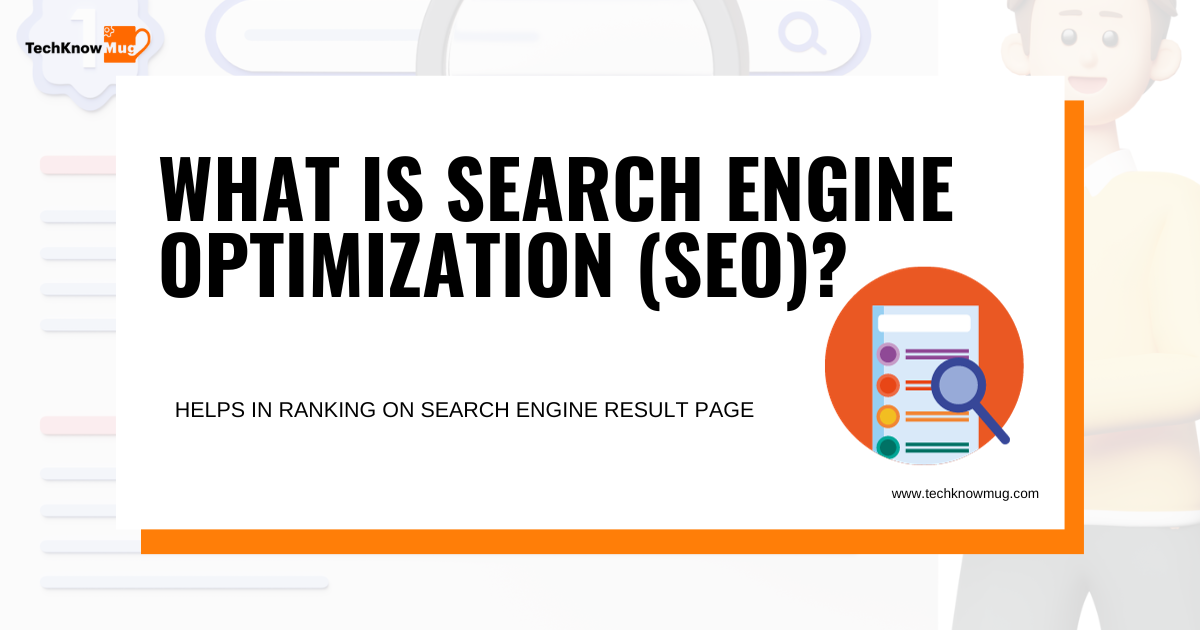
In the vast realm of the internet, SEO, or Search Engine Optimization, plays the role of a digital compass, guiding users to relevant content. Let’s dive into the basics with simplicity in mind.
What is SEO? | Search Engine Optimization
SEO is like a language that your favorite search engine speaks. It involves techniques and strategies to make your website more understandable and appealing to these search engines and Search Engine Optimization (SEO) is the strategic art of enhancing a website’s visibility on search engines like Google. It involves a myriad of techniques designed to optimize a website’s structure, content, and overall online presence. The goal? To rank higher in search engine results, driving organic traffic and increasing the site’s chances of being discovered by users. This involves keyword research, on-page optimization, quality content creation, and building reputable backlinks. SEO isn’t a one-time effort but an ongoing process, adapting to evolving search engine algorithms. Ultimately, it’s about aligning a website’s purpose with what users are actively searching for, creating a win-win for both sides of the digital equation.
Types of SEO: A Trio of Strategies
On-Page SEO:
On-page SEO is a crucial aspect of optimizing web content to enhance its visibility and relevance to search engines. It involves fine-tuning various elements directly on the website, such as optimizing meta tags, headers, and content. Keyword research plays a pivotal role, ensuring that the content aligns with commonly searched terms. The use of descriptive and compelling title tags not only improves search engine rankings but also attracts user clicks.
Structuring content with headers and subheadings not only enhances readability but also aids search engines in understanding the content hierarchy. Additionally, incorporating relevant keywords naturally throughout the content contributes to search engine algorithms recognizing the page’s relevance to specific queries. Optimizing images, improving page load speed, and ensuring mobile responsiveness further solidify a website’s on-page SEO, ultimately leading to improved search rankings and a better user experience.
Off-Page SEO:
Off-page SEO refers to the actions taken outside of your own website to impact your rankings within search engine results pages (SERPs). This primarily involves building high-quality backlinks to your site from reputable sources. These backlinks serve as “votes of confidence” in the eyes of search engines, indicating that your content is valuable and relevant.
10 Off-Page SEO Strategies of 2024 Which Elevate Your Keyword Rankings
Effective off-page SEO goes beyond link building and encompasses social media presence, social bookmarking, and online brand mentions. Engaging with your audience on various platforms not only drives traffic but also enhances your site’s credibility.
Guest posting on authoritative websites within your niche is a powerful off-page strategy. By contributing valuable content to other platforms, you not only expose your brand to a wider audience but also gain quality backlinks.
Additionally, maintaining an active presence on social media platforms not only fosters community engagement but also contributes to your off-page SEO. Social signals, such as likes, shares, and comments, are considered by search engines when evaluating a website’s authority.
In conclusion, off-page SEO is a multifaceted approach aimed at establishing your website’s credibility and relevance across the vast landscape of the internet. By building quality backlinks, engaging on social media, and contributing to authoritative platforms, you enhance your site’s visibility and climb the ranks in search engine results.
Technical SEO:
Technical SEO is a critical aspect of optimizing a website for search engines. It involves refining the technical elements to enhance site visibility and performance. Key components include optimizing website speed, improving crawlability for search engine bots, and ensuring proper indexing of content. XML sitemaps, clean URL structures, and mobile responsiveness are pivotal for a well-optimized site.
Additionally, employing structured data markup can enhance rich snippets in search results. By addressing these technical nuances, businesses can lay a solid foundation for improved search engine rankings and user experience.
Local SEO:
Local SEO, or Search Engine Optimization, is a crucial strategy for businesses aiming to enhance their online visibility within specific geographic areas. This approach involves optimizing a website to appear in local search results, making it easier for nearby customers to find relevant products or services.
Key components of local SEO include:
- Google My Business (GMB): Claiming and optimizing your GMB listing is fundamental. Provide accurate business information, including address, phone number, business hours, and categories. Encourage customers to leave reviews, as positive reviews can improve your local rankings.
- Local Keywords: Incorporate location-specific keywords in your website content. This helps search engines understand your geographical relevance. For example, if you’re a bakery in New York, use phrases like “New York bakery” strategically.
- On-Page SEO: Ensure your website’s meta titles, descriptions, and headers include relevant local keywords. This helps search engines understand the local focus of your content.
- Local Citations: Consistent business information across online directories and platforms builds credibility. Ensure your NAP (Name, Address, Phone number) details are uniform across various websites, boosting your local SEO.
- Local Link Building: Acquire backlinks from local businesses, community organizations, or local news outlets. Local links indicate your relevance to the community and positively impact search engine rankings.
- Mobile Optimization: With the increasing use of mobile devices for local searches, optimize your website for mobile users. Ensure that your site is responsive and provides a seamless experience on smartphones.
- Local Content: Create content that speaks to your local audience. This could include local events, news, or stories related to your business. Engaging local content not only attracts visitors but also signals to search engines that your business is community-oriented.
In summary, local SEO is about fine-tuning your online presence to align with the needs of local customers. By implementing these strategies, businesses can enhance their visibility in local search results, attracting relevant traffic and potential customers.
Why Search Engine Optimization Matters: The Web’s GPS
SEO isn’t just about impressing search engines; it’s about making your content easily discoverable by people looking for what you offer. It’s like putting your shop on the main street rather than a hidden alley.
What is Plagiarism-Free Content: The SEO Gold Standard
Originality is the hero of the SEO story. Search engines love fresh, unique content. Copy-pasting not only hurts your website’s credibility but also sends a red flag to search engines, pushing you down the visibility ladder.
In the grand SEO play, staying true to your digital identity, optimizing smartly, and keeping your content original are the keys to unlock the doors of online success.

63 thoughts on “Introduction to SEO: Unveiling the Web’s Secret Sauce ( Search Engine Optimization )”